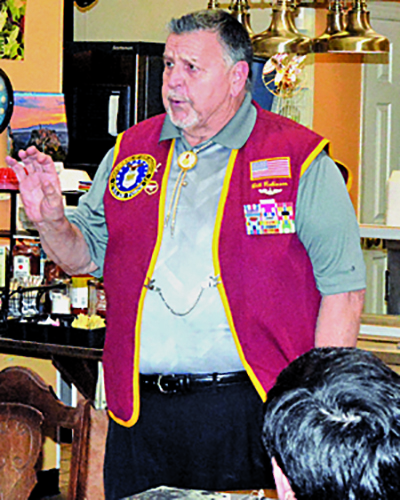Longest-enduring POW
‘I’m one of the luckiest men alive:’ POW Robinson in Town

“I can truly say I’m one of the luckiest men alive,” Robinson, who lives in Madisonville, said despite being shot down as an airman first class crew chief aboard a USAF rescue helicopter. He was captured in the Ha Tinh Province of North Vietnam on Sept. 20,1965.
“I was one month past my 22nd birthday.”
Why so lucky? “Only one out of five air-crew members shot down over North Vietnam survived,” said Robinson, featured speaker during the monthly Concord-Farragut GOP Club meeting in Fruition Café Thursday night, Dec. 2.
Of the “58,700-plus that were killed in action” in Vietnam, Robinson also noted “the fine print, which you don’t see very much of … 36,000 were 19 and under. … Of than number, over 1,500 are still missing in action and have not been accounted for — many will never be.
“We send our young people to war while the fat cats sit there and make up plans,” he added.
Reason for torture
The ex-POW spoke of “years of boredom punctuated by terror.”
However, “the torture was not about military information, it was trying to get us to join … the Vietnamese Communist Party,” said Robinson, who received an appendectomy without general anesthesia among the tortures he endured.
. “… They were trying to persuade their own people.”
Robinson himself was used for this purpose — without his consent, of course — when a photo of him “was taken three days after I was captured; it ended up being on a postage stamp,” he said.
Michael Christian
One young POW, USAF Maj. Michael Christian from Alabama, “took it upon himself, saying, ‘I grew up with a flag at my house, and we need one in our house,’” Robinson recalled.
Christian proceeded to make a U.S. flag out of a combination of clothes and other materials. “In the evening time he would put it on display in a corner of the room where the Vietnamese couldn’t see it when they were walking by the room,” Robinson said.
As the guards eventually found out and destroyed the flag, “Mike, the kind of person that he was, identified himself as the maker of the flag,” the ex-POW said. “He was severely tortured. … Eventually, they brought him back to the room near death.”
Using “cold water, a wash cloth and prayer,” Christian “was nursed back to health” by his colleagues, Robinson said.
Never discouraged, “with a smile from ear-to-ear looking at his roommates, Mike simply said, “’Time for flag No. 2,’” Robinson recalled.
“You never give up, you never give in, you roll with the punches and you bounce back,” he added.
Having faith
“Playing an important part” in keeping Robinson and the other POWs going “was faith,” he said. “We had faith in ourselves that we had the tools to get the job done; faith in each other that we would stand shoulder-to-shoulder and eventually return home; faith in our country that it would not abandon us under difficult circumstances.
“But most of all, faith in our God, that He would see us through,” Robinson added.
Little “outside” knowledge
Among his fellow POWs, “We had about 15 guys who had been there over five years, and their loved ones only found out they were alive a day before their names were announced in January of 1973,” Robinson said.
“… Essentially for three years we had no communication with the outside world — except for little sugar packs,” he added. “On the back side of them was a little history.
“That’s how we found out Neil Armstrong had walked on the Moon, on the back of a sugar pack.”
Turning point
Robinson said an intense 11-day United States bombing campaign, which began Dec. 18, 1972, was instrumental in the POWs’ release.
“We lost about 40 airmen during that 11-day period that gave me the right to stand here — it gave me the freedom to be here today,” said the ex-POW, who sold copies of his hardback book “The Longest Rescue” during his visit.
“I will always be grateful to them.”
Defining freedom
When the POWs began tasting freedom upon reaching the United States, a reporter asked one of those men “‘to define freedom,’” Robinson recalled.
“‘Doors with inside knobs,’” he quoted his ex-POW colleague as saying.


